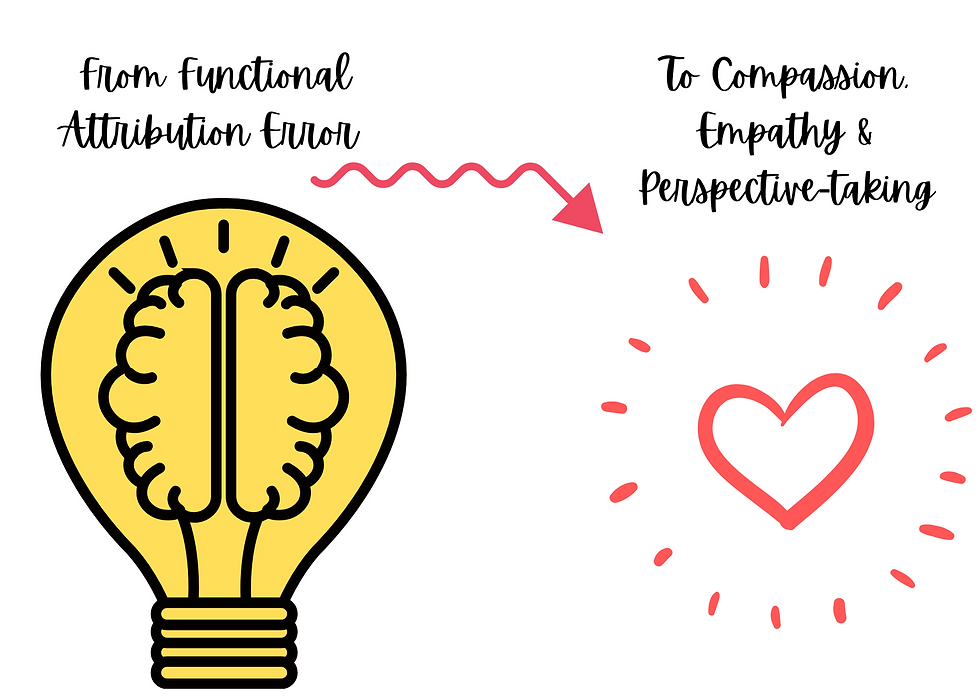Cognitive Bias and Relationships
- Sharon Tuttle
- Oct 17, 2021
- 3 min read
Updated: Oct 17, 2021

Cognitive bias is defined as:
a systematic error in thinking that occurs when people are processing and interpreting information in the world around them and affects the decisions and judgments that they make" [1].
When we are stressed, our brains go into action. They interpret. They process. They use prior experiences to determine meaning. Brains can be, and are often, wrong because we are human and we don't live inside of each other's brains.
Stressors such as,
why did that women say "oh your so-and-so's mom," instead of nice to meet you
or watching other mom's so easily make friends even and never invite you even though you know, they know, you have a girl the same age as their daughters
or seeing that social media post of girlfriends out on the town even though you asked if they wanted to do something this weekend and they never mentioned inviting you
or being at the receiving end of someone's anger or frustration that you didn't earn
All of these situations can lead, and likely will lead, to cognitive bias. Our brains are hardwired to come to conclusions quickly for our protection. My own brain processing immediately goes to "well, they are mean and didn't invite me". Instead of, "well, maybe there was something I did to indicate I wouldn't be interested or I didn't bother to speak up so they didn't extend the invitation". Or maybe that mom is socially awkward and thought that comment would be funny and give us something to laugh about whist becoming best friends. Who knows?
These cognitive processing misinterpretations are where empathy and digging deeper become integral practices in our daily interactions with others.
I could allow my brain to protect me and stick to what I originally thought about the motivations behind these behaviors and decisions OR I could look at the infinite number of possibilities and other interpretations.
Empathy allows us to assume positive intent and to look deeper into individual motivations that cause behavior and decisions. According to the Great Good Science Center empathy is
the ability to step into the shoes of another person, aiming to understand their feelings and perspectives, and to use that understanding to guide our actio
The author supplies 6 strategies to build empathy into everything we do, here are my favorite 4 that you can start implementing immediately.
Become curious about strangers
Challenge your personal prejudices and commonalities
Walk a mile in the other person's shoes
Listen more than you speak
If we look Biblically into empathy, we see verse after verse of compassion, putting others first, listening, perspective-taking, and examples of unconditional love and positive regard.
Lamentations 3:22-23 - God's compassion never fails
John 11:33-35 - Jesus wept for his best friend Lazarus
Matthew 22:36-39 - The 10 Commandments call us to love our neighbors
1 Peter 3:8 - Being of "one mind" and perspective taking
Romans 12:15 - weeping and rejoicing with others simply because they are
Hebrews 4:15 - Jesus came to us so He would know personally what the human experience felt like, so we could understand how to empathize with others
The Bible is rife with examples of empathy, compassion, and perspective taking. It also talks about Fundamental Attribution Error, even though it may not be deemed that in the Bible explicitly.
an individual's tendency to attribute another's actions to their character or personality, while attributing their behavior to external situational factors outside of their control. In other words, you tend to cut yourself a break while holding others 100 percent accountable for their actions. [3]
We can so easily explain away our decisions and make common the meaning of our own actions, but with others we require full dissertations when we feel wronged or slighted.
Maybe it is not the other person's responsibility to explain their behaviors and decisions, but our first responsibility is to determine what biases or cognitive thinking has gone as-cue before we jump down other people's throats and create enemies. Then, and maybe then, we can start a conversation about how people's actions or words affected us.
Breathe.
Think.
Analyze.
Abort devious mission to destroy other human.

References:




Comments